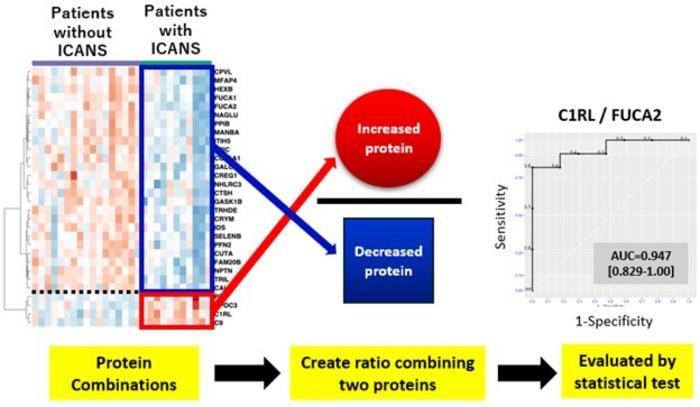
In a groundbreaking study, researchers at Kyushu University have unveiled a revolutionary method to predict the onset of a life-threatening condition associated with cancer immunotherapy. This study focuses on immune effector cell-associated neurotoxicity syndrome (ICANS), a neurological side effect that can occur in patients undergoing CAR-T-cell therapy—a type of immunotherapy that harnesses the body’s immune system to attack cancer cells.
The research team meticulously analyzed cerebrospinal fluid obtained from patients before they commenced CAR-T therapy, leading to the discovery of several proteins that serve as biomarkers for predicting the development of ICANS. This research opens new avenues for enhancing patient safety, as early identification of high-risk individuals may allow for timely intervention or preventative measures that could mitigate the risk of severe neurological events.
The significance of this discovery cannot be overstated, especially given the increasing popularity of CAR-T-cell therapy, which has shown remarkable success in treating refractory blood cancers. However, patients undergoing this therapy are at risk of encountering serious and potentially fatal side effects, including inflammatory responses within the central nervous system that can lead to impaired consciousness, seizures, or even brain hemorrhages.
Dr. Yuya Kunisaki, a key figure in this study, emphasized the urgency of finding reliable predictive measures for ICANS, particularly considering the high incidence rate of this syndrome following CAR-T therapy—estimated to be around 64%. Kakuni, along with his colleagues, has identified specific proteins that exhibit distinct levels in patients who develop ICANS in comparison to those who do not, thereby positioning these proteins as viable biomarkers for the prediction of ICANS.
The researchers began their study with a sample of cerebrospinal fluid from 29 patients diagnosed with B-cell non-Hodgkin’s lymphoma. Through rigorous proteomic analysis, they identified a total of 864 different proteins present within the cerebrospinal fluid samples. Ultimately, their investigation narrowed this number down to 46 proteins that displayed significant differences in expression levels between patients who developed ICANS and those who remained unaffected.
Among these proteins, two emerged as particularly noteworthy: C1RL, which was found to be elevated in patients who developed ICANS, and FUCA2, which demonstrated decreased levels in the same group. By analyzing the ratio of these two proteins, the researchers established a predictive equation that achieved remarkably high accuracy, yielding a score of 0.95 in ROC curve analysis—an impressive validation of its predictive potential.
To confirm the efficacy of this predictive model, the researchers conducted a follow-up analysis with a second group of 10 patients undergoing CAR-T therapy. The results corroborated their earlier findings as the biomarker ratio accurately identified the risk of all patients for developing ICANS, thereby highlighting its robustness as a predictive tool.
Despite these promising findings, the researchers caution that their results are still preliminary due to the limited size of their sample population. As co-first author Dr. Tomoko Nomiyama pointed out, further studies with a larger cohort of patients are necessary to fully validate these observations and to strengthen the evidence for the biomarker ratios they have identified.
If subsequent studies confirm these preliminary results, the implications for clinical practice could be transformative. The identification of patients at high risk for ICANS through a simple cerebrospinal fluid analysis permits a paradigm shift in patient management—a proactive approach toward treatment that could include early interventions or preventive therapies aimed at reducing the likelihood of ICANS manifestations altogether.
Additionally, the researchers are exploring the feasibility of identifying similar predictive biomarkers in less invasive samples, such as blood serum. Given that the collection of cerebrospinal fluid is typically invasive and not routinely performed prior to CAR-T therapy in most hospitals, the ability to glean this vital information from standard blood tests would vastly improve accessibility and practicality for predicting ICANS.
This research not only underscores the potential for personalized medicine in the realm of cancer treatment but also exemplifies the promising intersection between proteomics and clinical oncology. By marrying advanced proteomic analysis with clinical insights, the ability to tailor cancer treatment to individual patient profiles is becoming increasingly realistic, paving the way for safer and more effective therapeutic strategies.
As the team continues to expand their research, they are committed to confirming the reliability of their biomarkers across a broader spectrum of blood cancers. The hope is that these findings could eventually lead to the establishment of universal predictive tests that could become standard practice in oncology settings, allowing for more informed treatment decisions and improved patient outcomes.
Ultimately, the strides made by this research team may redefine the landscape of cancer immunotherapy. With ongoing advancements in biomarker identification and validation, clinicians will be better equipped to preemptively address the risks associated with therapies like CAR-T-cell treatment, facilitating a more patient-centric approach to cancer care.
Subject of Research: People
Article Title: Cerebrospinal Fluid Proteomics Exerts Predictive Potential for ICANS in CAR-T Therapy
News Publication Date: 11-Mar-2025
Web References: Kyushu University
References: Nomiyama T., Setoyama D., Yamanaka I., et al. “Cerebrospinal Fluid Proteomics Exerts Predictive Potential for ICANS in CAR-T Therapy.” Leukemia.
Image Credits: Daiki Setoyama, Kyushu University
Keywords: ICANS, CAR-T therapy, cerebrospinal fluid, biomarkers, predictive model, proteomics, cancer immunotherapy, central nervous system, personalized medicine, Kyushu University.
Tags: breakthrough cancer researchcancer immunotherapy side effectsCAR-T-cell therapy safetycerebrospinal fluid analysisearly detection of cancer therapy risksenhancing patient safety in immunotherapyinflammatory responses in CAR-T therapyKyushu University medical researchneurological side effects of cancer treatmentneurotoxicity syndrome biomarkerspatient intervention strategiespredicting ICANS in patients





